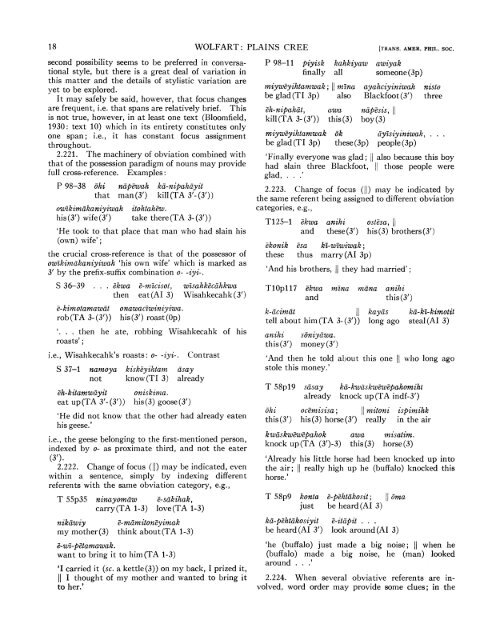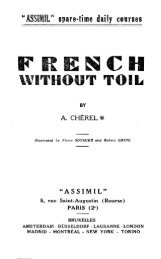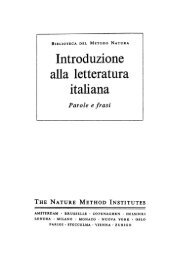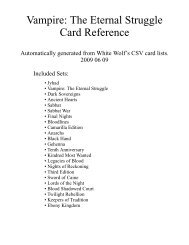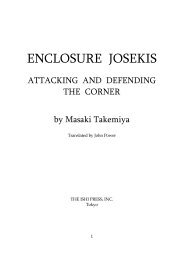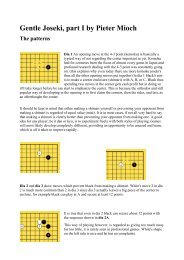Plains Cree: A Grammatical Study - Computer Science Club
Plains Cree: A Grammatical Study - Computer Science Club
Plains Cree: A Grammatical Study - Computer Science Club
Create successful ePaper yourself
Turn your PDF publications into a flip-book with our unique Google optimized e-Paper software.
18 WOLFART: PLAINS CREE<br />
[TRANS. AMER. PHIL. SOC.<br />
second possibility seems to be preferred in conversa-<br />
tional style, but there is a great deal of variation in<br />
this matter and the details of stylistic variation are<br />
yet to be explored.<br />
It may safely be said, however, that focus changes<br />
are frequent, i.e. that spans are relatively brief. This<br />
is not true, however, in at least one text (Bloomfield,<br />
1930: text 10) which in its entirety constitutes only<br />
one span; i.e., it has constant focus assignment<br />
throughout.<br />
2.221. The machinery of obviation combined with<br />
that of the possession paradigm of nouns may provide<br />
full cross-reference. Examples:<br />
P 98-38 ohi napewah kd-nipahdyit<br />
that man(3') kill (TA 3'-(3'))<br />
owikimakaniyiwah itohtahew.<br />
his(3') wife(3') take there(TA 3-(3'))<br />
'He took to that place that man who had slain his<br />
(own) wife';<br />
the crucial cross-reference is that of the possessor of<br />
owikimdkaniyiwah 'his own wife' which is marked as<br />
3' by the prefix-suffix combination o- -iyi-.<br />
S 36-39 . . . ekwa e-mzcisot, wisahkecdhkwa<br />
then eat(AI 3) Wisahkecahk(3')<br />
e-kimotamawdt onawaczwiniyiwa.<br />
rob(TA 3-(3')) his(3') roast(Op)<br />
. . . then he ate, robbing Wisahkecahk of his<br />
roasts';<br />
i.e., Wisahkecahk's roasts: o- -iyi-. Contrast<br />
S 37-1 namoya kiskeyihtam asay<br />
not know(TI 3) already<br />
eh-kitamwdyit oniskima.<br />
eat up(TA 3'-(3')) his(3) goose(3')<br />
'He did not know that the other had already eaten<br />
his geese.'<br />
i.e., the geese belonging to the first-mentioned person,<br />
indexed by o- as proximate third, and not the eater<br />
(3').<br />
2.222. Change of focus (11) may be indicated, even<br />
within a sentence, simply by indexing different<br />
referents with the same obviation category, e.g.,<br />
T 55p35 ninayomaw e-sakihak,<br />
carry(TA 1-3) love(TA 1-3)<br />
nikdwiy e-mamitoneyimak<br />
my mother(3) think about(TA 1-3)<br />
e-wz-petamawak.<br />
want to bring it to him(TA 1-3)<br />
'I carried it (sc. a kettle(3)) on my back, I prized it,<br />
[I I thought of my mother and wanted to bring it<br />
to her.'<br />
P 98-11 piyisk kahkiyaw awiyak<br />
finally all someone (3p)<br />
miyweyihtamwak; |1 mina ayahciyiniwah nisto<br />
be glad(TI 3p) also Blackfoot(3') three<br />
eh-nipahat, awa ndpesis, I<br />
kill(TA 3-(3')) this(3) boy(3)<br />
miyweyihtamwak ok dyisiyiniwak, . . .<br />
be glad(TI 3p) these(3p) people(3p)<br />
'Finally everyone was glad; 11 also because this boy<br />
had slain three Blackfoot, II those people were<br />
glad,<br />
2.223. Change of focus (11) may be indicated by<br />
the same referent being assigned to different obviation<br />
categories, e.g.,<br />
T125-1 ekwa anihi ostesa, ||<br />
and these (3') his(3) brothers(3')<br />
ekonik esa ki-wiwiwak;<br />
these thus marry(AI 3p)<br />
'And his brothers, 1] they had married';<br />
T10pl17 ekwa mina mana anihi<br />
and this(3')<br />
k-acimdt 1] kayds<br />
tell about him(TA 3-(3')) long ago<br />
anihi soniydwa.<br />
this (3') money (3')<br />
ka-kz-kimotit<br />
steal (AI 3)<br />
'And then he told about this one [1 who long ago<br />
stole this money.'<br />
T 58pl9 sdsay kd-kwdskwwewepchomiht<br />
already knock up(TA indf-3')<br />
ohi ocemisisa; 1[ mitoni ispimihk<br />
this(3') his(3) horse(3') really in the air<br />
kwdskwewepahok awa misatim.<br />
knock up(TA (3')-3) this(3) horse(3)<br />
'Already his little horse had been knocked up into<br />
the air; 1I really high up he (buffalo) knocked this<br />
horse.'<br />
T 58p9 konta -pehtakosit; 11 oma<br />
just be heard (AI 3)<br />
ka-pehtakosiyit e-itdpit . . .<br />
be heard (AI 3') look around (AI 3)<br />
'he (buffalo) just made a big noise; 1] when he<br />
(buffalo) made a big noise, he (man) looked<br />
around . . .'<br />
2.224. When several obviative referents are in-<br />
volved, word order may provide some clues; in the


